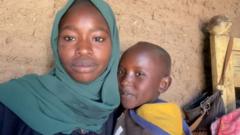The World Food Programme highlights a critical food shortage in el-Fasher, Sudan, where 250,000 residents struggle amidst artillery attacks and blockade by paramilitary forces. Activists report fatalities due to starvation, compelling the UN to push for emergency aid access.
UN Sounds Alarm as El-Fasher Faces Dire Food Crisis

UN Sounds Alarm as El-Fasher Faces Dire Food Crisis
In the besieged city of el-Fasher, Sudan, residents are on the brink of starvation as humanitarian efforts are severely hindered by ongoing conflict.
In the war-ravaged region of Darfur, the UN's World Food Programme (WFP) has raised urgent concerns regarding escalating starvation levels in the besieged city of el-Fasher. With supply routes blocked for over a year, local families face the harrowing reality of dwindling food resources. The city, which remains encircled by Rapid Support Forces (RSF), has been subject to conflict for nearly 16 months as paramilitary groups vie for control against Sudan's army.
Reports suggest that the humanitarian crisis has reached alarming heights, with local activists indicating that starvation-related deaths have already been recorded. Eric Perdison, WFP's regional director for Eastern and Southern Africa, emphasized the overwhelming struggle for daily survival facing the people of el-Fasher, warning that without immediate humanitarian access, countless lives remain at risk.
The local population of approximately 250,000 is suffering from severe food shortages, exacerbated by skyrocketing prices for basic supplies. WFP reported distressing accounts of residents resorting to eating animal feed and food waste to subsist. An eight-year-old girl named Sondos, who fled the city, described the horror of shelling and persistent hunger that defines life in el-Fasher.
While WFP has food aid trucks prepared for deployment, the security situation complicates the situation further, following a previous convoy that was attacked, leaving humanitarian efforts stalled. As the UN promotes a week-long humanitarian ceasefire to facilitate aid delivery, uncertainty looms regarding the response from the conflicting parties.
The ongoing civil war in Sudan, which erupted in April 2023, has cultivated what the UN describes as one of the worst humanitarian crises worldwide, leading to devastating loss of life and exacerbating conflict in Darfur. With over 150,000 fatalities attributed to the violence, and approximately 12 million displaced individuals, the plight of Sudan's people remains critical.
Reports suggest that the humanitarian crisis has reached alarming heights, with local activists indicating that starvation-related deaths have already been recorded. Eric Perdison, WFP's regional director for Eastern and Southern Africa, emphasized the overwhelming struggle for daily survival facing the people of el-Fasher, warning that without immediate humanitarian access, countless lives remain at risk.
The local population of approximately 250,000 is suffering from severe food shortages, exacerbated by skyrocketing prices for basic supplies. WFP reported distressing accounts of residents resorting to eating animal feed and food waste to subsist. An eight-year-old girl named Sondos, who fled the city, described the horror of shelling and persistent hunger that defines life in el-Fasher.
While WFP has food aid trucks prepared for deployment, the security situation complicates the situation further, following a previous convoy that was attacked, leaving humanitarian efforts stalled. As the UN promotes a week-long humanitarian ceasefire to facilitate aid delivery, uncertainty looms regarding the response from the conflicting parties.
The ongoing civil war in Sudan, which erupted in April 2023, has cultivated what the UN describes as one of the worst humanitarian crises worldwide, leading to devastating loss of life and exacerbating conflict in Darfur. With over 150,000 fatalities attributed to the violence, and approximately 12 million displaced individuals, the plight of Sudan's people remains critical.



















